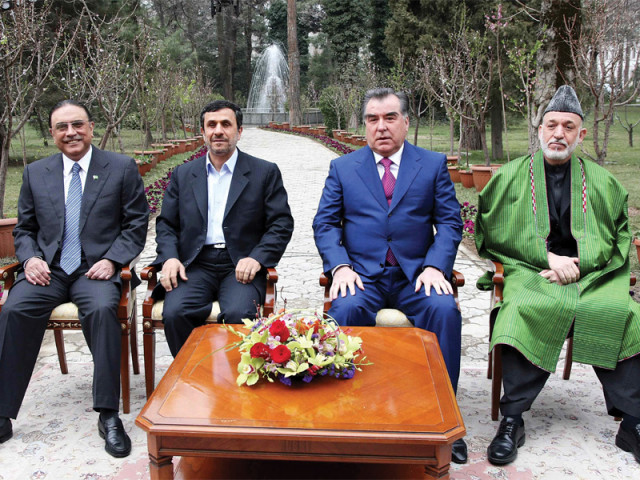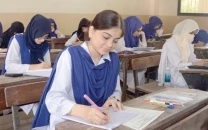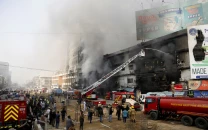Dushanbe quadrilateral meeting: Looking past US curbs, govt pushes ahead with IP project
Pakistan, Iran, Afghanistan and Tajikistan in a united front against terror, militancy and drug trafficking.

In a clear snub to the United States over its sanction threats, Pakistan has reassured Iran and other regional countries that the proposed gas pipeline projects will go ahead as planned.
Ahead of a key regional security summit in the Tajik capital, President Asif Ali Zardari told his counterparts from Iran, Afghanistan and Tajikistan that his country was committed to completing the Iran-Pakistan (IP) and Turkmenistan-Afghanistan-Pakistan-India (TAPI) gas pipeline projects. “I look forward to working with you on all issues of mutual interest,” he added.
US Secretary of State Hillary Clinton warned earlier this month that Pakistan could face US sanctions if it pressed ahead with the gas pipeline project with Iran. “[This] would be particularly damaging to Pakistan because their economy is already quite shaky,” Clinton had told a Congressional hearing.
At Sunday’s quadrilateral meeting in Dushanbe, Presidents Asif Zardari, Hamid Karzai, Mahmoud Ahmedinejad and Emomali Rahmon renewed their resolve to put up a joint fight against terrorism, militancy and drug trafficking for a ‘win-win situation’. They also agreed to tap the full economic potential of the region by strengthening trade and economic cooperation among them.
The four leaders – who were together for Nowruz celebrations hosted by the Tajik leader –discussed matters of mutual interest, including ways and means to strengthen trade and economic cooperation, among their countries.
Presidential spokesperson Farhatullah Babar later said that President Zardari underscored the need for enhanced regional cooperation to overcome the drug trafficking-militancy nexus – a major impediment in the trade and economic development of the region. The president said he had taken up the issue at international level and would continue to pursue it adding. “We must work together.”
About the Afghan imbroglio, President Zardari said that ‘non-state actors’ wanted to destabilise Afghanistan. But Pakistan is committed to peace in the region, particularly in Afghanistan, because a stable Afghanistan is also in the interest of the country.
The president said that in the post 2014 geo-strategic scenario after the drawdown of foreign forces from Afghanistan, closer cooperation among the four countries in all fields, particularly defence, security and intelligence-sharing, assumes greater significance. All the four leaders were unanimous in the view that terrorism and militancy pose a serious threat to peace, security and socio-economic development of the region and need to be tackled jointly and through regional approach and solutions.
Iranian President Mahmoud Ahmadinejad used his visit to the Tajik capital to ratchet up rhetoric in the face of renewed international pressure over his country’s contested nuclear drive.
“Only the friends and neighbours of Afghanistan can in practice and realistically help this nation,” Ahmadinejad said in a statement released by his office on Saturday. “The occupiers who came to this nation from kilometres away are not here to aid the government and the people of Afghanistan but are here to loot the resources and mines of Afghanistan,” he said.
However, unlike Ahmadi-nejad’s, the speeches of Zardari and Karzai were more restrained that made no reference to the presence of foreign troops in Afghanistan or the United States.
The quadrilateral meeting came as President Barack Obama’s regional pointman Marc Grossman sat down with Afghan Deputy Foreign Minister Jawed Ludin and Pakistan’s Foreign Secretary Jalil Abbas Jilani to discuss Karzai’s visit to Islamabad last month.
Grossman has been handed the delicate mission of ensuring Iran does not use its historic ties to Pakistan to spread its influence over Afghanistan after the Western troop withdrawal is complete.
Grossman said his meeting focused on Karzai’s ‘very successful’ visit to Islamabad which was followed by the Afghan leader’s invitation for the Taliban militia to open direct talks with his government.
The Taliban leadership broke off contacts with the United States in mid-March because of a row over a prisoner swap. But Grossman sounded an optimistic note, saying that “we now find ourselves in a happy position of building on our momentum”.
Grossman also met President Zardari who told him that the parliamentary review of Pakistan-US relations, which was long overdue, is a manifestation of democracy taking roots in Pakistan and the elected representatives taking ownership of one of Pakistan’s most important bilateral relationships.
He said that the government would act within the parameters set by parliament and would not bypass it.
Published in The Express Tribune, March 26th, 2012.



















COMMENTS
Comments are moderated and generally will be posted if they are on-topic and not abusive.
For more information, please see our Comments FAQ